Secondments of B-LigZymes Project
In the B-Ligzymes project, 180 out of 211 planned secondments were completed, achieving an 85% implementation rate. Despite being blocked for 18 months due to the COVID-19 pandemic, the project enabled forty researchers at various career stages to develop new R&I, transfer skills, and enhance their future career opportunities through international and intersectoral stays of up to 12 months.
This initiative strengthened our networks and organizational capacity, contributing to Europe's competitiveness, growth, and knowledge-based economy and society. Thank you to the EC and everyone involved!!
People who have performed secondments through B-Ligzymes:

#47 - Ognjen Pećanac (GECCO, NL) secondment at ITQB, PT (July 2024)
Ognjen is doing his secondment at ITQB, Portugal, intending to identify improved variants of a Directed-Evolution library of a Galactose Oxidase and generate epPCR libraries for a bacterial epoxidase from GECCO.

#46 - Ivana Maric (GECCO, NL) secondment at UNIPV, IT (June 2024)
Ivana is doing her secondment at University of Pavia, Italy, with the goal of evaluating the structure of lignin-converting enzymes and understanding computational aproaches to identify potential variants with improved activity towards desired substrates.
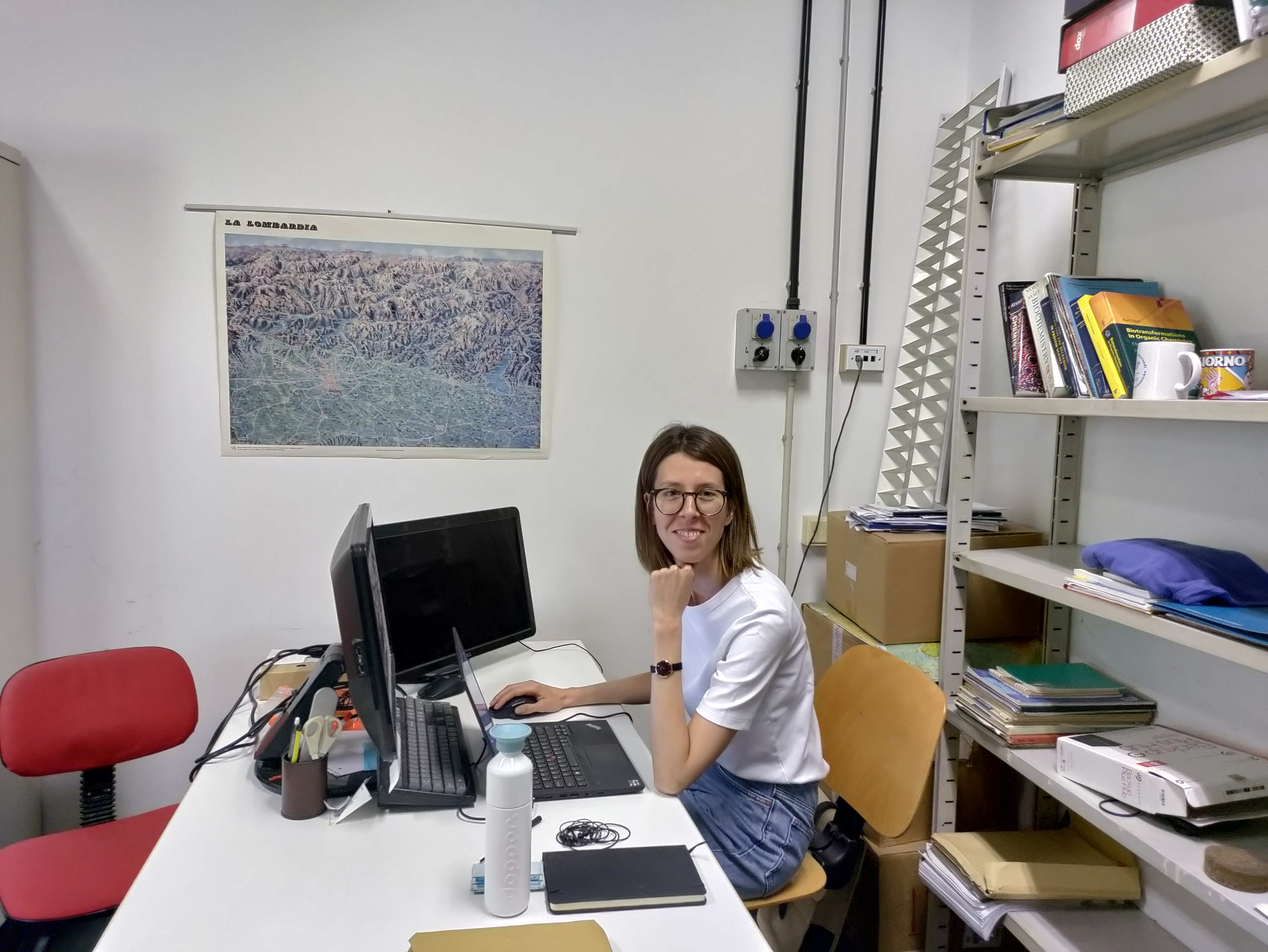
#45 - Sol Canale (CONICET, AR) secondment at Zymvol, ES (April-June 2024)
Sol is doing her secondment at Zymvol to interpret the effect of predicted mutants based on computational simulations. Sol will also train to design mutants that increase the specific activity of a bacterial xylanse - CsXyn10A

#44 - Matteo Gigli (UNIVE, IT) secondment at NCSU, US (May 2024)
Matteo is doing his secondment at NCSU to work on the development of lignin coatings for paper-based packaging. Various coating process conditions will be screened and optimized to maximize the amount and homogeneity of lignin (or LNPs) deposited on the cellulose-based paper substrate. The obtained composites will be characterized in terms of morphology, physic-mechanical, and barrier characteristics by state-of-the-art techniques.

#43 - Tomás Frazão (ITQB, PT) secondment at Zymvol, ES (April-July 2024)
Tomás is doing his secondment at Zymvol to study a bacterial copper-dependent galactose oxidase, PsGalOx. The goal of combining crystal structures with AlphaFold modeling is to obtain a complete, copper-loaded structure. This structure will then be analyzed for Protein Residue Networks and Substrate Specificity using Docking and Molecular Dynamics.

#42 - Marcus Shallmey (TUBS, DE) secondment at Zymvol, ES (March-June 2024)
Marcus is doing his secondment at Zymvol to study Glutathione Amide Reductases (GAR) due to their potential in the enzymatic degradation of lignin. Through the modeling of a bacterial GAR and molecular dynamic simulations, the goal is to get insights into crucial residues and possible mutations to improve activity.

#41 - Nicholus Bhattacharjee (Zymvol, ES) secondment at ITQB, PT (April 2024)
Nicholus is doing his secondment at ITQB-UNL for a month. He wants to conduct immobilization experiments with novel His-tag enzymes. He will also characterize the immobilized enzymes, performing experiments such as SDS-PAGE analysis, assessment of thermal stability and resin preparation.

#40 - Alessandro Boverio (UniPV, IT) secondment at GECCO, NL (February 2024)
Alessandro is doing his secondment in Gecco Biotech, Groeningen, intending to explore new heme-containing enzymes and implement their production. During the secondment, Alessandro will perform expression trials, substrate scope testing, and scaling up production through a bioreactor.

#39 - Julian Pagel (TUBS, DE) secondment at GECCO, NL (March-July 2024)
Julian is doing his secondment in Gecco Biotech, Groeningen, to analyze different lignin samples based on their β-O-4-aryl ether bonds and to study the cleavage of these bonds by glutathione-dependent ligninolytic enzymes.

#38 - Daniel H. Murgida (CONICET, AR) secondment at ITQB-UNL, PT (December 2023)
Daniel is doing his secondment in ITQB, Lisbon, to perform experiments, discuss results with colleagues and students, plan future experiments, and prepare manuscripts for joint research endeavors.

#37 - Lígia O. Martins (ITQB, PT) secondment at CONICET, AR (December 2023)
Lígia is doing her secondment in Conicet, Buenos Aires, for Research-Education purposes: meetings with students, discussions about investigation projects and planning of work publication and communication. Lígia also gave one seminar on the work done in the Microbial and Enzyme Technology Lab at ITQB.

#36 - Catarina Barbosa (ITQB, PT) secondment at CONICET, AR (October-November 2023)
Catarina is doing her secondment in Buenos Aires, intending to build screen-printed electrodes with a Dye-decolorizing Peroxidase (DyP) immobilized with different nanoparticles and, by using scanning electron microscopy, characterizing this miniaturized device using a DyP from Pseudomonas putida as the bioreceptor.
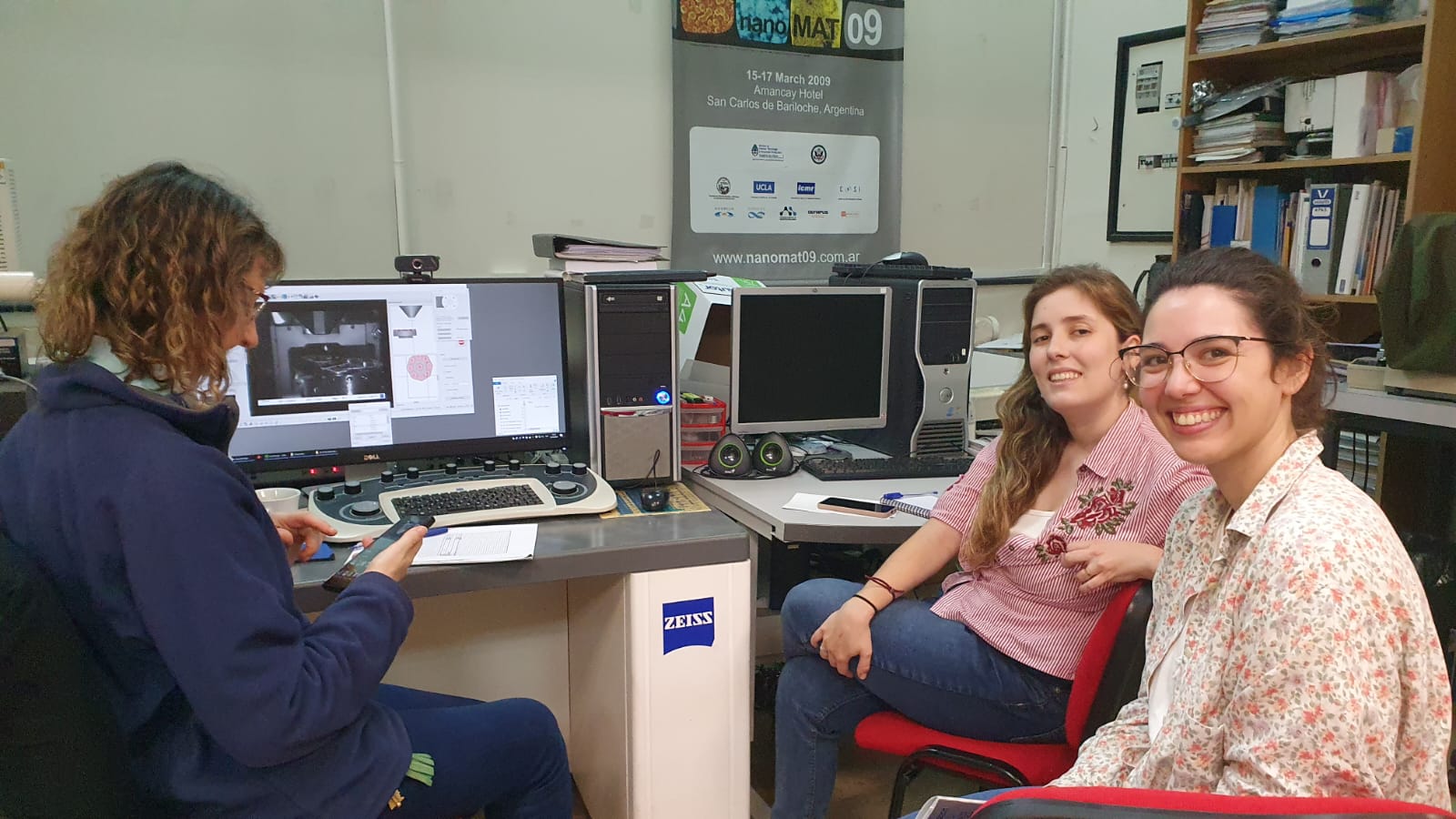
#35 - Célia Silveira (ITQB, PT) secondment at CONICET, AR (October-November 2023)
Célia spent a month at Conicet intending to use Real real-time-resolved surface-enhanced Resonance Raman (TR SERR) spectroelectrochemistry to study the reaction mechanism of Dye-decolorizing Peroxidase (DyP) immobilized on Ag electrodes and study the molecular mechanism and heterogeneous electron transfer processes of DyPs immobilized on electrode surfaces.
.
#34 - Smilja Todorovic (ITQB, PT) secondment at CONICET, AR (August 2023)
Smilja spent a month in Buenos Aires to optimize the UV-vis spectroelectrochemical measurements to measure the redox potential of a DyP-type Peroxidase and its variants. Additionally, Smilja participated in dissemination activities with a seminar entitled “Biophysical view of Fe centers in enzymes, focusing on heme and FeS clusters.”

#33 - Dimitris Argyropoulos (NCSU, US) secondment at UniVe, IT (July 2023)
Dimitris has done his secondment at the University of Ca’Foscari of Venice for research-education activities: Coordination and collaboration on activities on Preparing Enzymatic Mild Acidolysis Lignins that may then be used in understanding the pathways of human formation, seminars, and Participation in the International Symposium on Wood Fiber & Pulping Chemistry Conference.
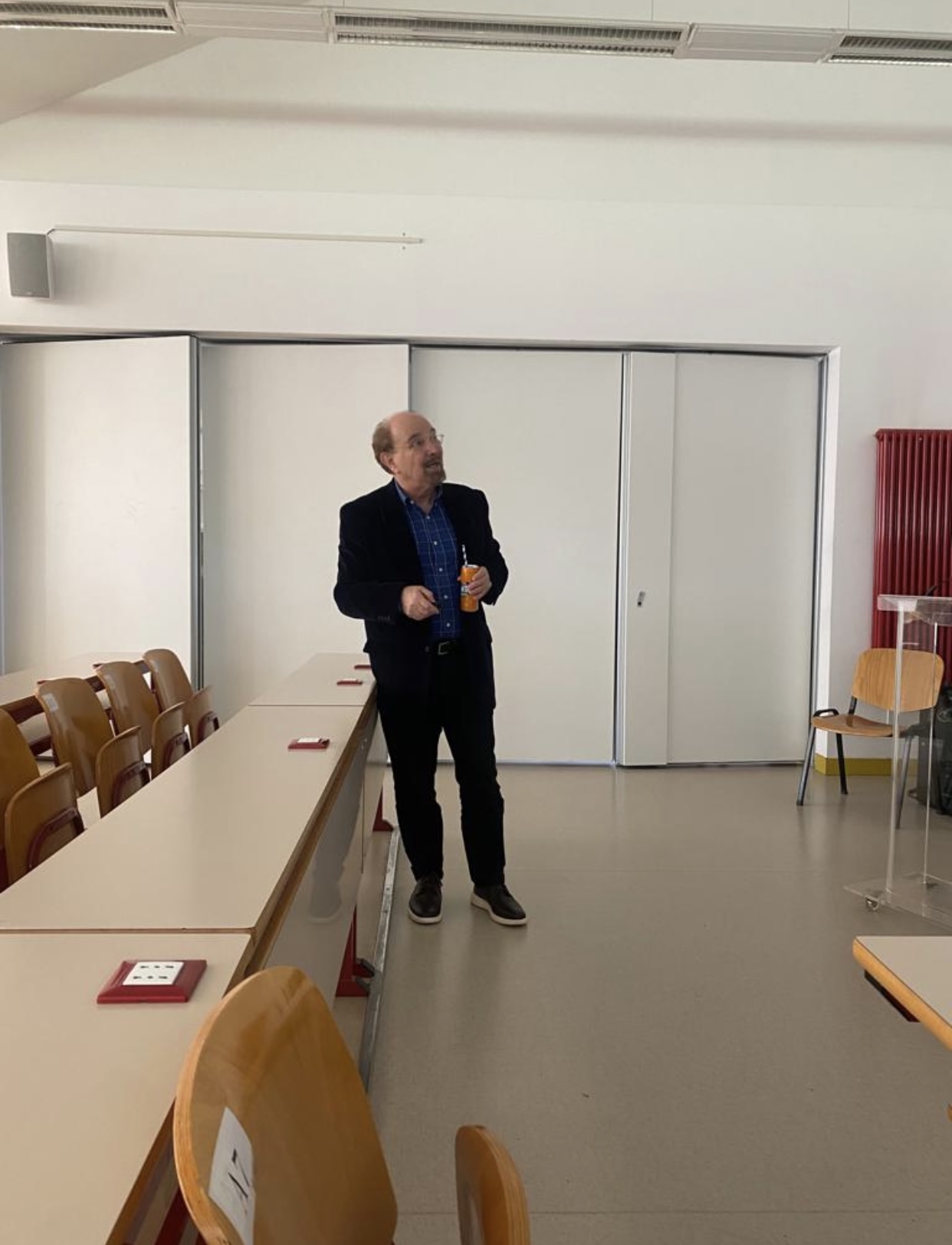
#32 - Nathalie Lavoine (NCSU, US) secondment at UniVe, IT (July 2023)
Nathalie is doing her secondment at the University of Ca’Foscari of Venice for research-education activities: Research seminars, networking on research projects, On-site training, and Participation in the International Symposium on Wood Fiber & Pulping Chemistry Conference.

#31 - Juande Barajas (MetGen, FI) secondment at UniVe, IT (June-July 2023)
Juande will spend two months in Venice exploring the potential application of Laccases and developing enzyme immobilization systems to be applied in MetGen. The goal of his secondment was to immobilize a Laccase and characterize the biochemical properties of this system.
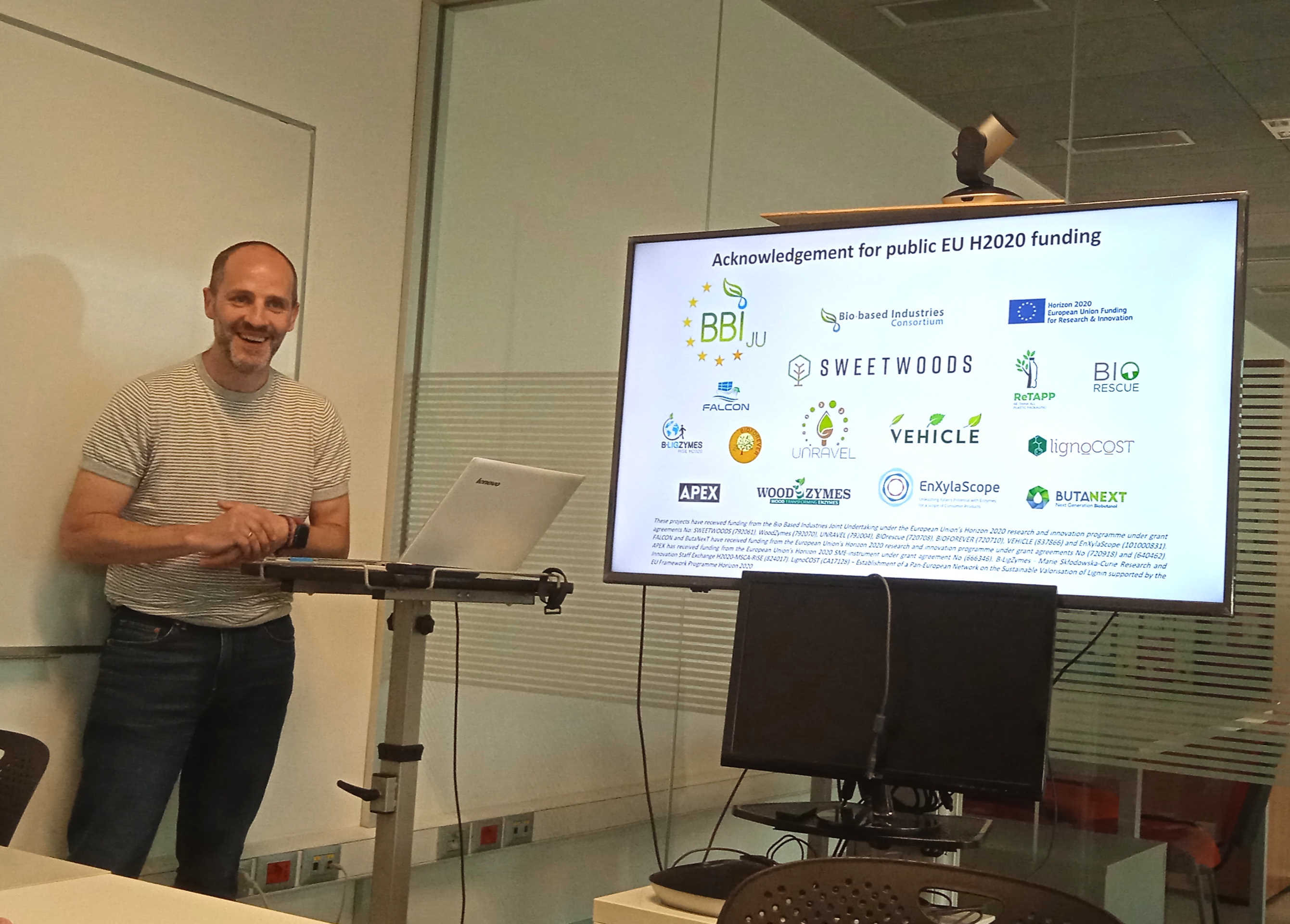
#30 - Brian Jimenez (ZymVol, ES) secondment at ITQB, PT (June 2023)
Brian is coming to ITQB to validate inhibitor candidates for protease enzymes experimentally. Proteases are frequently used in detergent formulations, but they tend to degrade all other enzymes in these formulas. To maintain them in a low activity state when the detergent is not being used or under storage conditions, they must be deactivated with inhibitors.
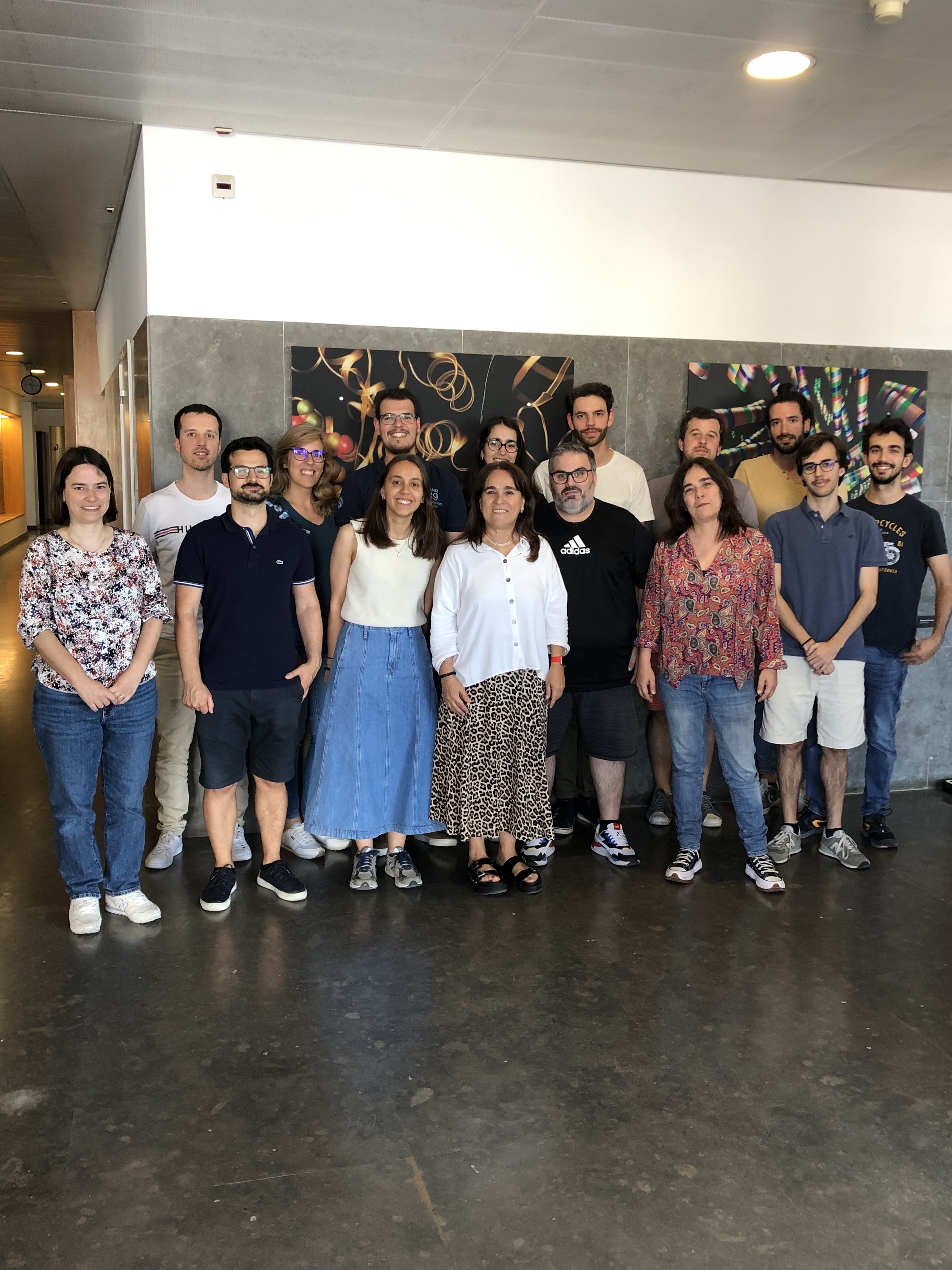
#29 - Ferran Sancho (ZymVol, ES) secondment at ITQB, PT (March-August 2023)
Ferran will provide computational support to ITQB NOVA to support their research efforts. This will involve assisting with computational simulations and calculations and supporting students. He will also develop an expert system that will help store and organize biochemical data, which will ultimately be implemented as SaaS software as a service.

#28 - Martín Palazzolo (CONICET, AR) secondment at RUG, NL (February-November 2023)
Martín will work on pyrolytic lignin's chemical and biological processing to produce valuable products.
To optimize the fermentation of pyrolytic lignin, Martín will test a chemical pretreatment, ozonolysis, and a biological pretreatment, Enzymatic oxidation, and see how these affect the fermentation process and the production of interesting nutraceuticals such as PUFAs, polyunsaturated fatty acids.

#27 - Francisco Vieyra (CONICET, AR) secondment at TUBS, DE (February-April 2023)
Francisco will work with Unspecific Peroxygenases (UPOs), enzymes whose function is still undetermined but which have great potential as biocatalysts. Francisco will express UPOs from Botryobasidium botryosum, Daldinia caldariorum, and Collariella virescens using the E. coli expression system and characterize their stability and activity.

#26 - Daniel Murgida (CONICET, AR) secondment at ITQB, PT (December 2023)
Daniel H. Murgida will deliver one plenary lecture on his fields of expertise: the use and development of advanced computational, spectroscopic, electrochemical, and spectroelectrochemical methods for metalloenzyme characterization and manipulation. Daniel will also maintain more focused meetings with Ph.D. students and postdocs from Prof. Martins and Prof. Todorovic's labs on implementing these methodologies for their specific protein systems.

#25 - Carolina Dias (ITQB, PT) secondment at MetGen, NL (November 2022-May 2023)
Carolina will study the filamentous fungus Trichoderma reesei, an organism known for its potent degradative machinery capable of decomposing the often heterogeneous substrates available. This strain is currently used for biomass hydrolysis and further fractionation of the biomass streams for valorization, including sugars and lignin. To improve the fermentation efficiency and consistency, it is desirable to modify the current strain's morphology while maintaining the cellulases' high-level expression.
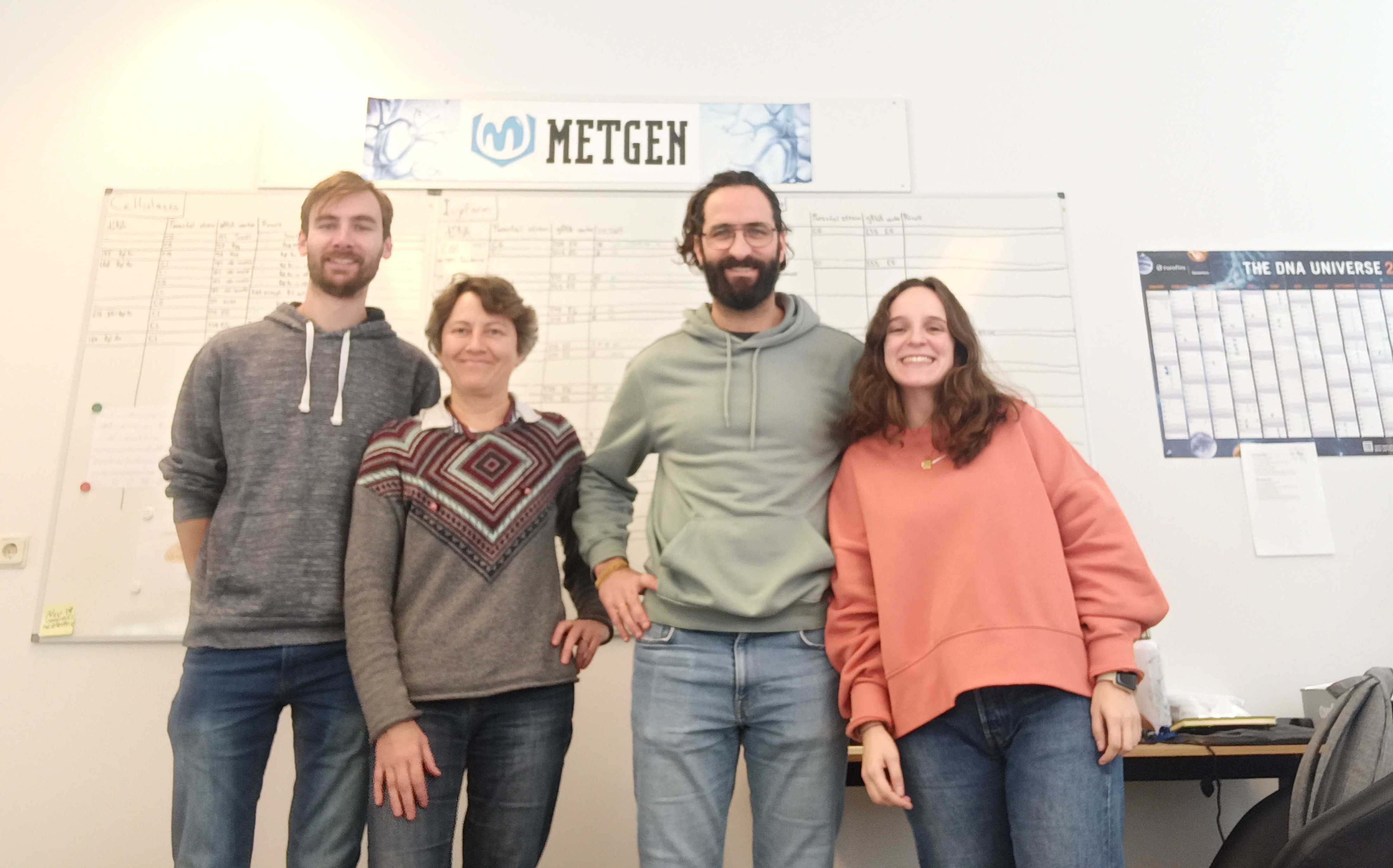
#24 - Patrícia Borges (ITQB, PT) secondment at ZymVol, ES (October 2022-December 2022)
Patrícia will study an engineered Metallo-oxidase from Aquifex aeolicus. This enzyme has been engineered into a laccase, and its activity towards the lignin-related phenolic compound Syringol was improved. Patrícia will use molecular dynamic analysis, substrate docking, calculation of electron transfer pathways, and analysis of protein residues networks to reveal the structural determinants of the improved activity for syringol observed in this variant.
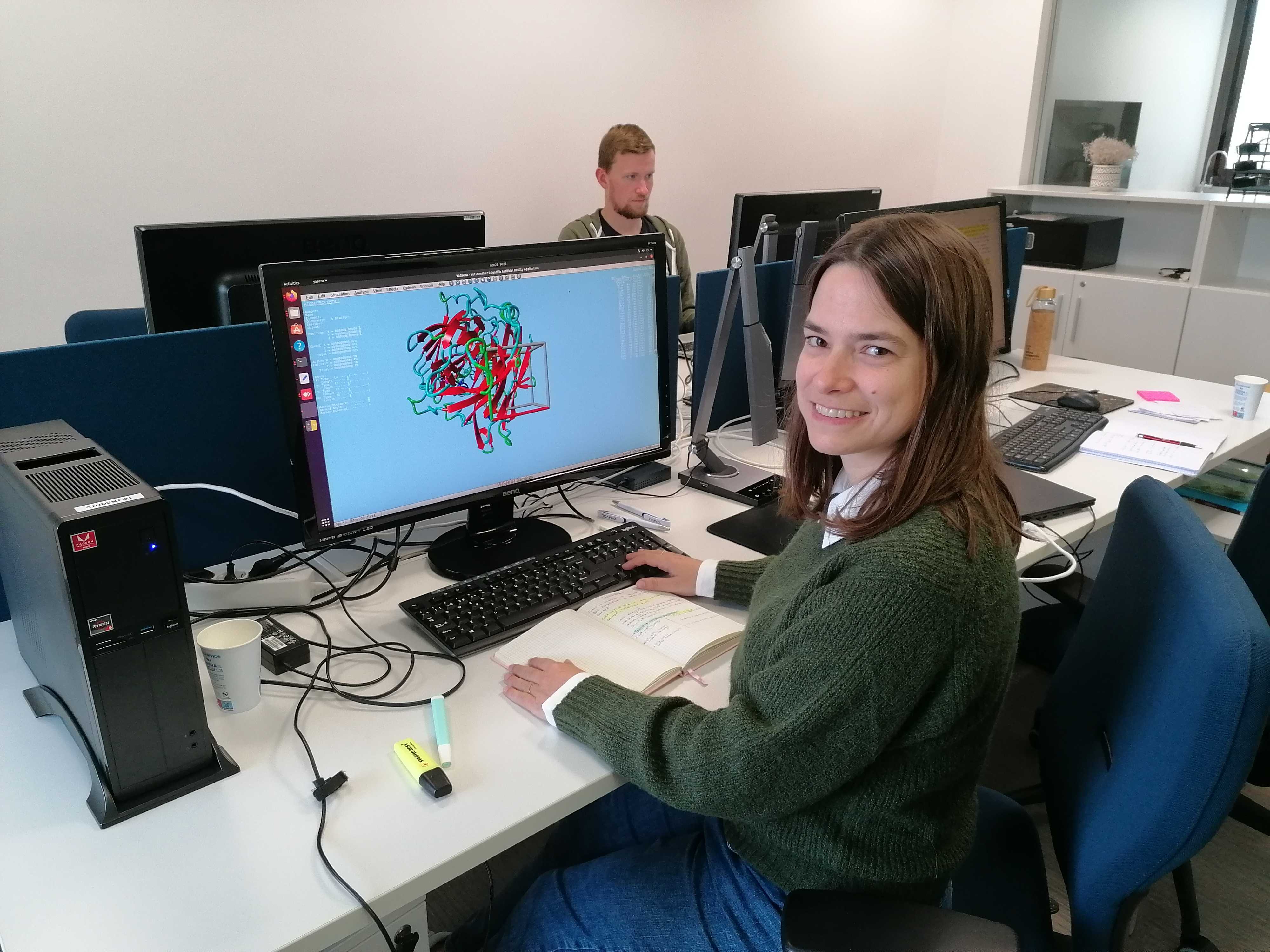
#23 - Linus Grunewald (RUG, NL) secondment at ZymVol, ES (October 2022)
Linus will optimize the workflow to discover new enzymes, particularly enzymes containing the flavin mononucleotide (FMN) cofactor. Many of the reactions catalyzed by FMN-containing enzymes are of interest to industry, and therefore, the discovery of these enzymes is critical to further increasing protein use in industry.
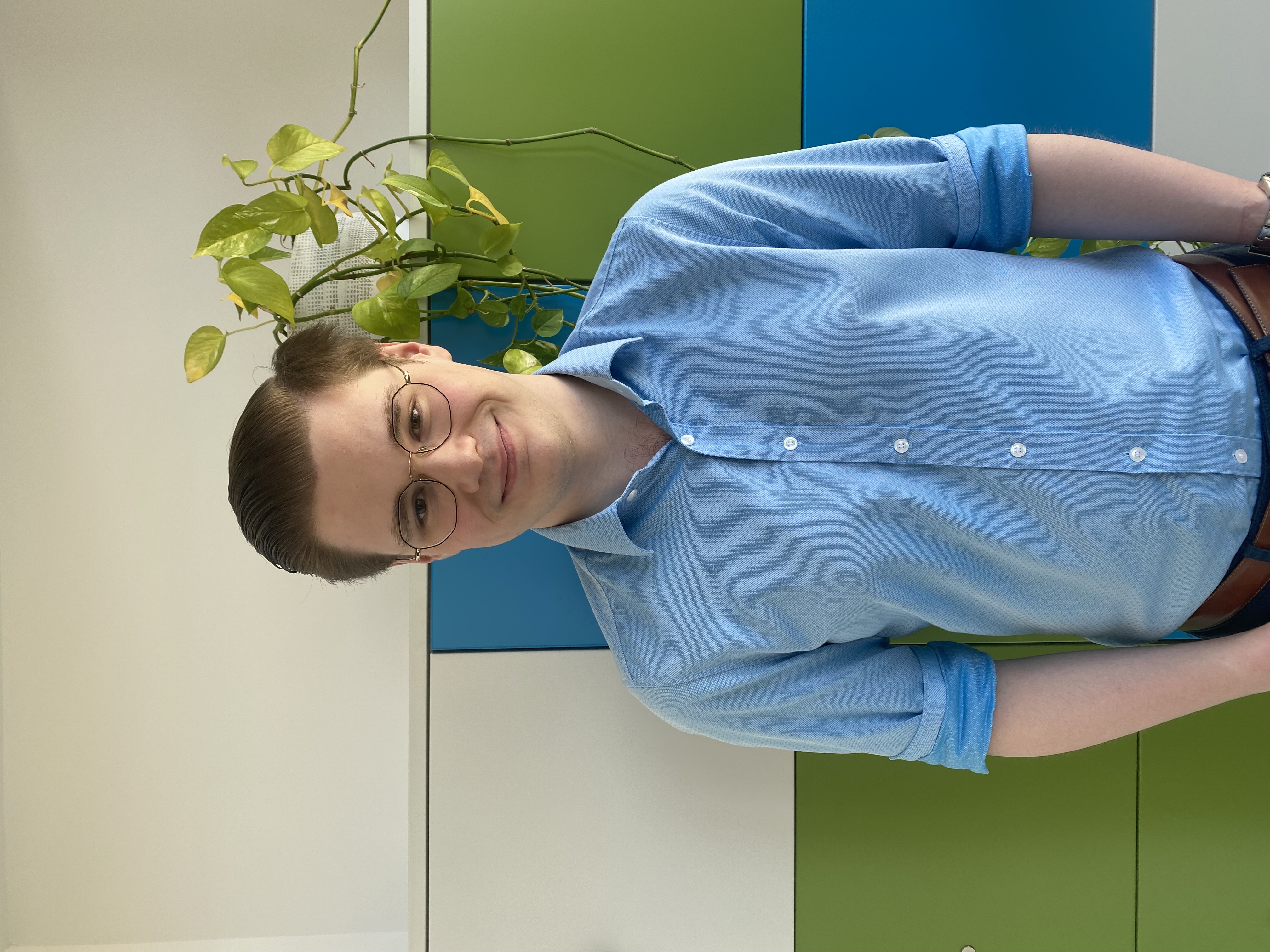
#22 - Felix Brandt (TUBS, DE) secondment at ZymVol, ES (September 2022 - December 2022)
Felix will study a bacterial glutathione-dependent-β-etherase capable of cleaving β-O-4 aryl ether bonds frequently found in lignin. The enzymatic cleavage of this bond is an essential aspect of the whole lignin depolymerization process and consequent lignin valorization. He will use MD simulations, network, and centrality analysis to investigate the catalytic mechanism of the wild-type enzyme and the effects of the mutation P142A on the cycle and active site.
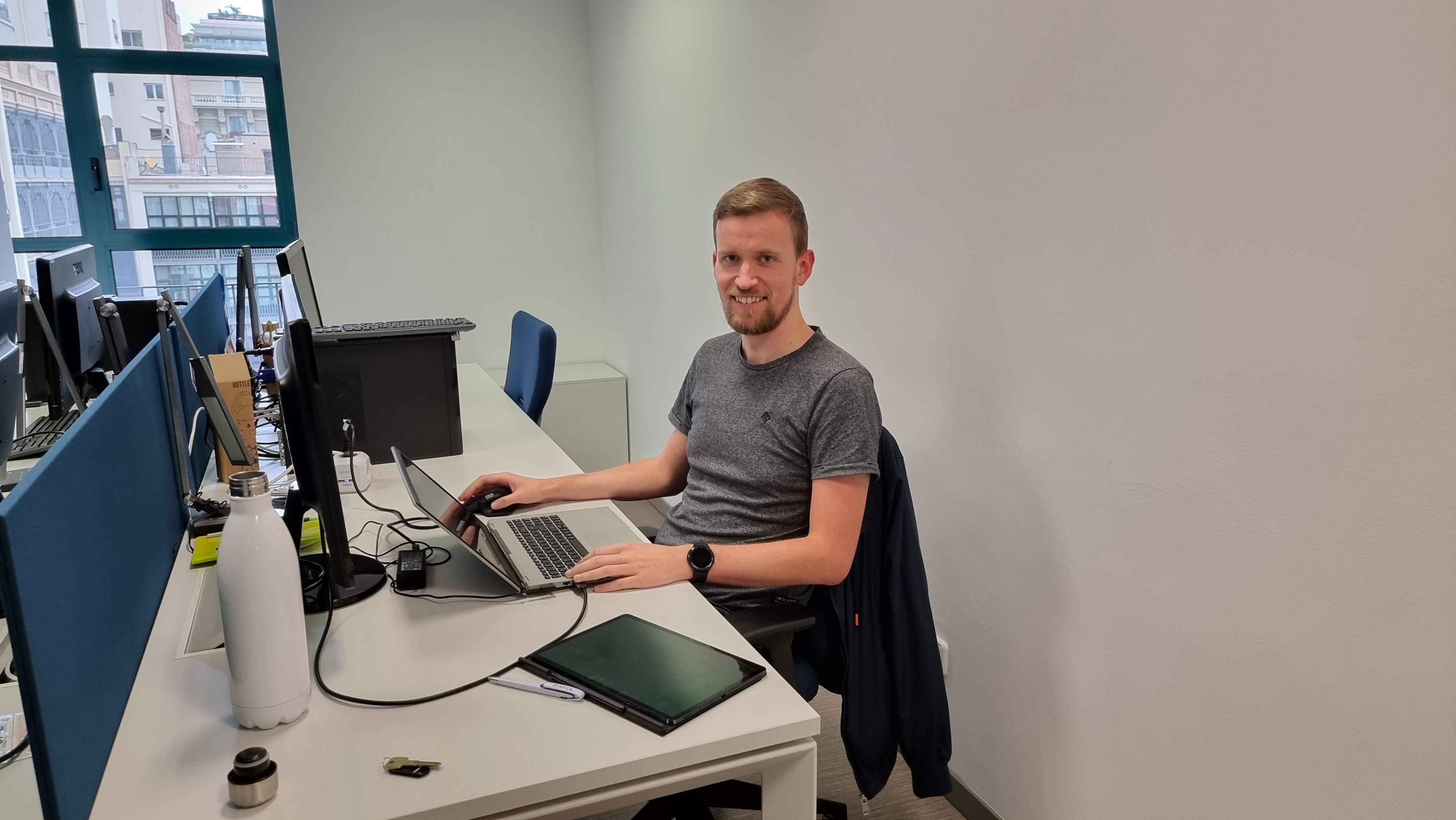
#17 (2nd part)- Claudia Crestini (UNIVE, IT) secondment at NCSU, USA (August 2022)
Claudia Crestini from Università Ca' Foscari Venezia; IT is spending the second part of her secondment at Marko Hakovirta Lab, North Carolina State University, USA, for 15 days.
Claudia's research focuses on the design of depolymerization and fractionation of lignin using enzymes.
Claudia and Nicolò (Secondment #12) also participated in the Gordon Research Conference "Realizing Lignin's Potential in Biorefining by Bridging Plant Biology, Chemistry, and Engineering."

#21 - Margarita Seeger (TUBS, DE) secondment at MetGen, NL (May 2022 - August 2022)
Margarita from Braunschweig, Germany, has started her secondment at MetGen in their Dutch branch. She aims to express seven new Unspecified Peroxygenases (UPOs) using Trichoderma as an expression system. UPOs are fungal enzymes believed to be involved in lignin degradation. However, their recombinant expression is underwhelming.

#20 – Melody Godoy (INTEQUI, AT) secondment at RUG, NL (May 2022- May 2023)
Melody from our new partner group, Martin Palazzolo at INTEQUI, CONICET (AR), has started her secondment at RUG, NL. Her research aimed to produce microbial lipids from spent yerba mate. She will focus on the isolation of lignin from spent yerba mate and in-depth characterization of this fraction, followed by enzymatic oxidation of the isolated lignin and its potential use for microbial fermentation.

#19 – Maria Fátima Lucas (Zymvol, ES) secondment at ITQB-NOVA, PT (April 2022)
Maria Fátima Lucas, the CEO of Zymvol Biomodeling, ES, has done the first part of the secondment at Lígia Martins Lab, ITQB, Universidade Nova de Lisboa, PT, for 15 days.
Maria Fátima was an invited speaker at this year’s Ph.D. Meeting Event, giving an excellent presentation on her trajectory from academia to the industry. Maria talked about her career, starting with a Ph.D. in enzyme catalysis using quantum mechanics to the foundation of the biotech company Zymvol, enlightening the audience on the challenges at the interface of academia and industry. During her secondment, Fátima connected with the partners at ITQB to discuss the ongoing work associated with the B-Ligzymes project.

#18 - Nikola Loncar (GEECO, NL) secondment at ITQB-NOVA, PT (April 2022)
Nikola Loncar, the CEO of GECCO Biotech, NL, has done the first part of the secondment at Lígia Martins Lab, ITQB, Universidade Nova de Lisboa, PT, for 15 days.
Nikola gave an exciting seminar on Development Driven by Enzymes, where he provided first-hand experience in how to bridge fundamental research and biotechnological industries. He talked about what is needed to start a biotech company and the R&D work done on redox enzymes in the context of the RISE B-Ligzymes project. During his stay, Nikola had the opportunity to discuss with several students their work and Ph.D. projects, which allowed them to find opportunities for further collaboration within the B-Ligzymes project.

#17 (1st part) - Claudia Crestini (UNIVE, IT) secondment at NCSU, USA (March 2022)
Claudia Crestini from Università Ca' Foscari Venezia; IT is doing her first part of the secondment at Marko Hakovirta Lab, North Carolina State University, the USA, for 15 days.
Claudia´s work is focused on WP4. Design and set-up of enzymatic processes mainly on bioprocesses for lignin depolymerization and fractionation plus modification and valorization of enzymatic-modified lignins. She was a speaker at the ACS spring 2022 and gave a seminar at NCSU. Claudia also coordinated the activity of the ESR (Nicolò Pajer)secondment in collaboration with NCSU about laccase-mediated grafting of lignin onto the nanofibrillated cellulose surface.
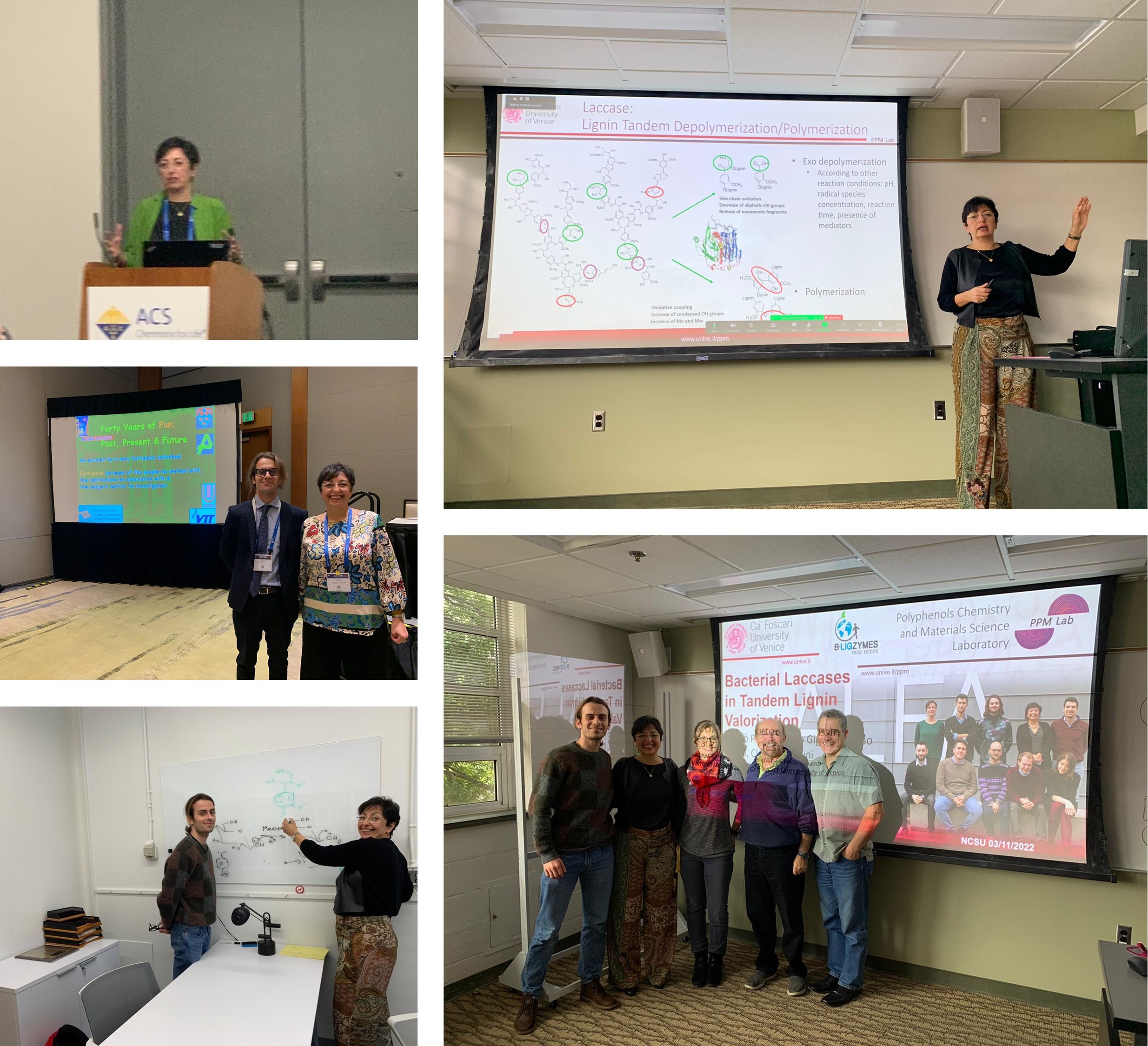
#1 (2nd part)- Magali Scocozza (INQUIMAE, AR) secondment at ITQB-UNL, PT Feb-March 2022 [1st part (May-Nov 2019)]
This second part of her secondment is proposed within the context of her Ph.D. thesis, focused on the study of a novel family of heme enzymes named Dye-type Peroxidases (DyPs) that can oxidize a wide variety of inorganic and organic substrates (from small dyes to lignin subunits), thus being a potential eco-friendly route to obtain valuable chemical products. DyPs present a heme group that acts as the redox center and can fit small substrates and H2O2 and show surface binding sites at aromatic residues such as tryptophan and tyrosine where larger substrates can be oxidized.

#16 - Benedetta Guerriere (UniPV, IT) secondment at GECCO, NL (Feb-Nov 2022)
Benedetta Guerriere from our new partner group, Andrea Mattevi, at Università di Pavia, has started her secondment at Gecco Biotech B.V. in Groningen, NL. She will focus on the engineering of FAD- and heme-containing oxidative enzymes through structure-based mutagenesis, searching for new mutants used for the bioconversions of phenolic and alcoholic compounds with boosted thermostability and activity.
The secondee will have an opportunity to learn and practice modern molecular biology tools, gain experience in enzyme production, and learn various analytical methods, including HPLC and GC.

#15 - Davide Carraretto (UniPV, IT) secondment at GECCO, NL (Feb-Nov 2022)
Davide Carraretto from our new partner Andrea Mattevi at Università di Pavia has started his secondment at Gecco Biotech B.V. in Groningen, NL. He will explore bacterial enzymes as new peroxygenases and intends to improve them for biocatalytic processes.

#14 - Tomás Frazão (ITQB-UNL, PT) secondment at ZYMVOL, ES (Dec 2021, August 2022)
Tomás Frazão from Ligia O. Martins Lab is doing his secondment at ZYMVOL in Barcelona, ES, for 1 semester. Tomás will study and optimize AsP2Ox variants for biosensor applications through computational methods, which could be a much-needed step toward better understanding and improvement.
During the holiday season at ZYMVOL, he also took some time off work to test puzzle-solving skills in an escape room with the Team!
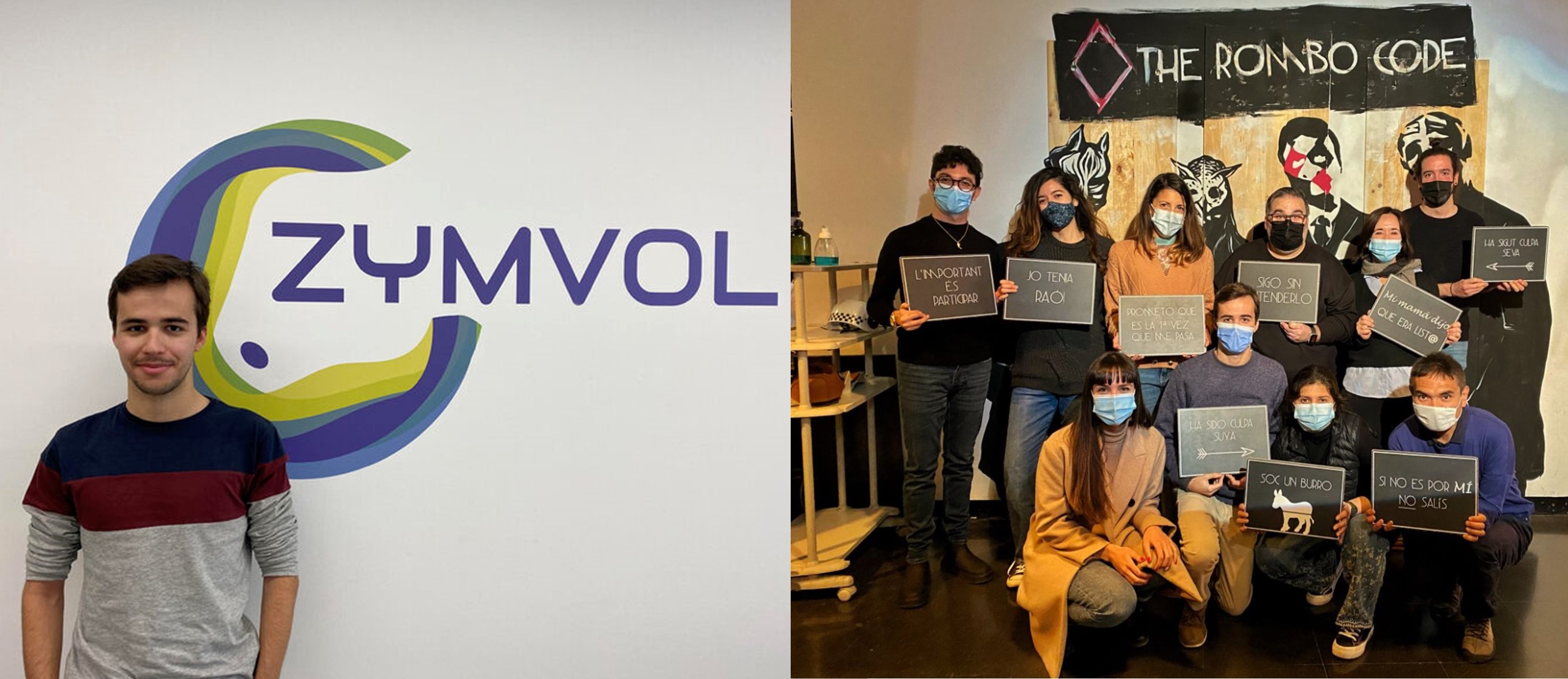
#13 - João Costa (ITQB-UNL, PT) secondment at GECCO, NL (Dec 2021- April 2022)
João Costa has started his secondment at Gecco Biotech B.V. in Groningen. He will be working partly on supporting Caterina Martin's work on enzymes for biosensors and mainly on developing novel oxidoreductases. João Costa will be able to learn and practice modern molecular biology tools, gain experience in enzyme expression optimization and purification methods at different scales, and improve his knowledge of enzymology.
The project will be in a small, highly dynamic company embedded in the University of Groningen campus. He will have close contact with the international community and other researchers.
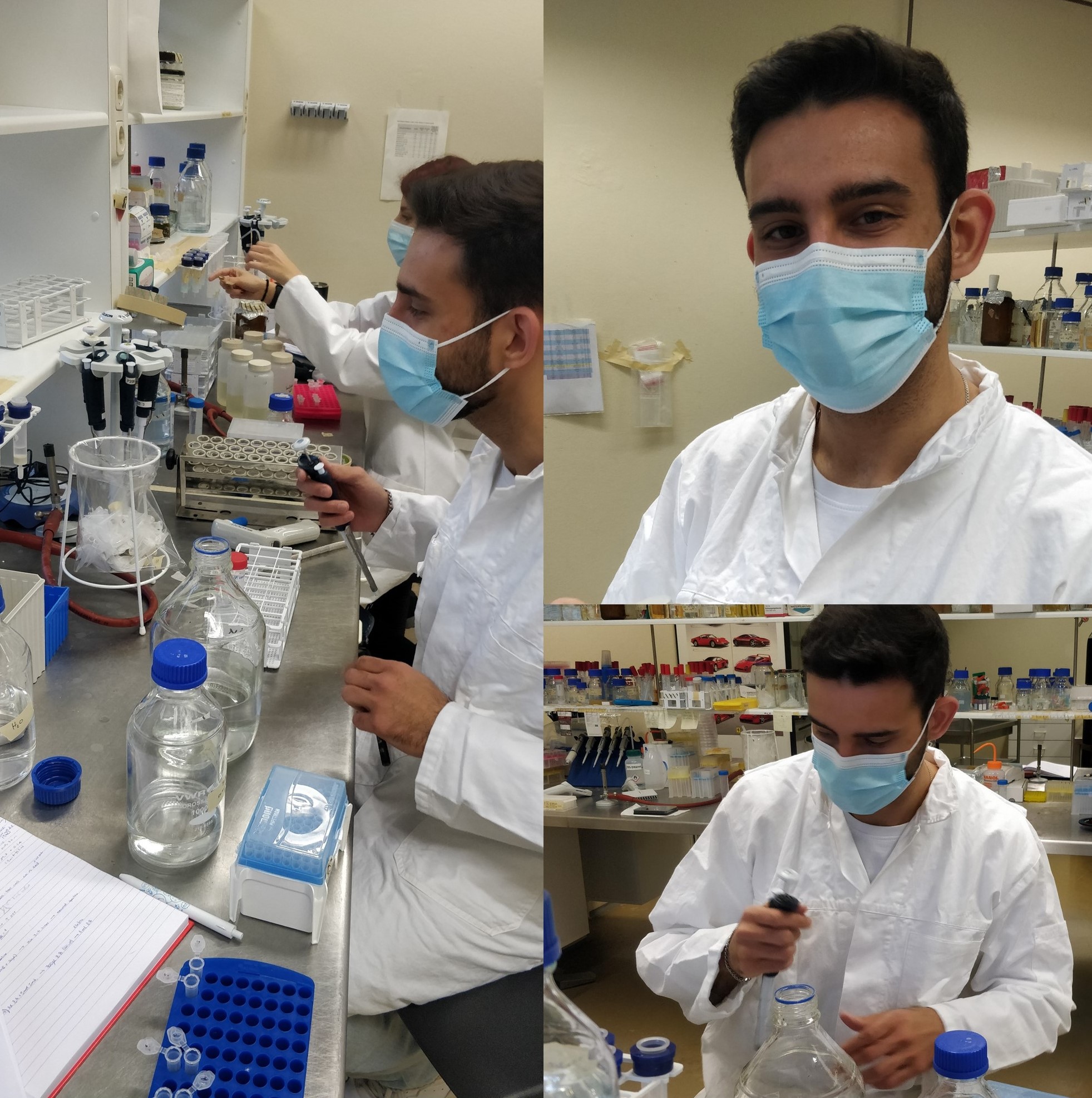
#12 - Nicolò Pajer (UNIVE, IT) secondment at NCSU, USA (Sept 2021-Aug 2022)
Nicolò Pajer from Claudia Crestini, Lab, Università Ca' Foscari Venezia, IT is doing his secondment at Marko Hakovirta Lab, North Carolina State University, USA, for one year.
Nicolò will use state-of-the-art analytical techniques to understand further the nature and chemistry of the scCO2 isolated extract from softwood kraft lignin in the optic to understand intricate structural details of it and offer some control to the perpetual problem of odor and color of technical kraft lignin.
In addition, his research will examine the possibility of using oxidative enzymes to treat the lignin surface before the extraction and possibly use an enzymatic approach to enhance odor elimination.
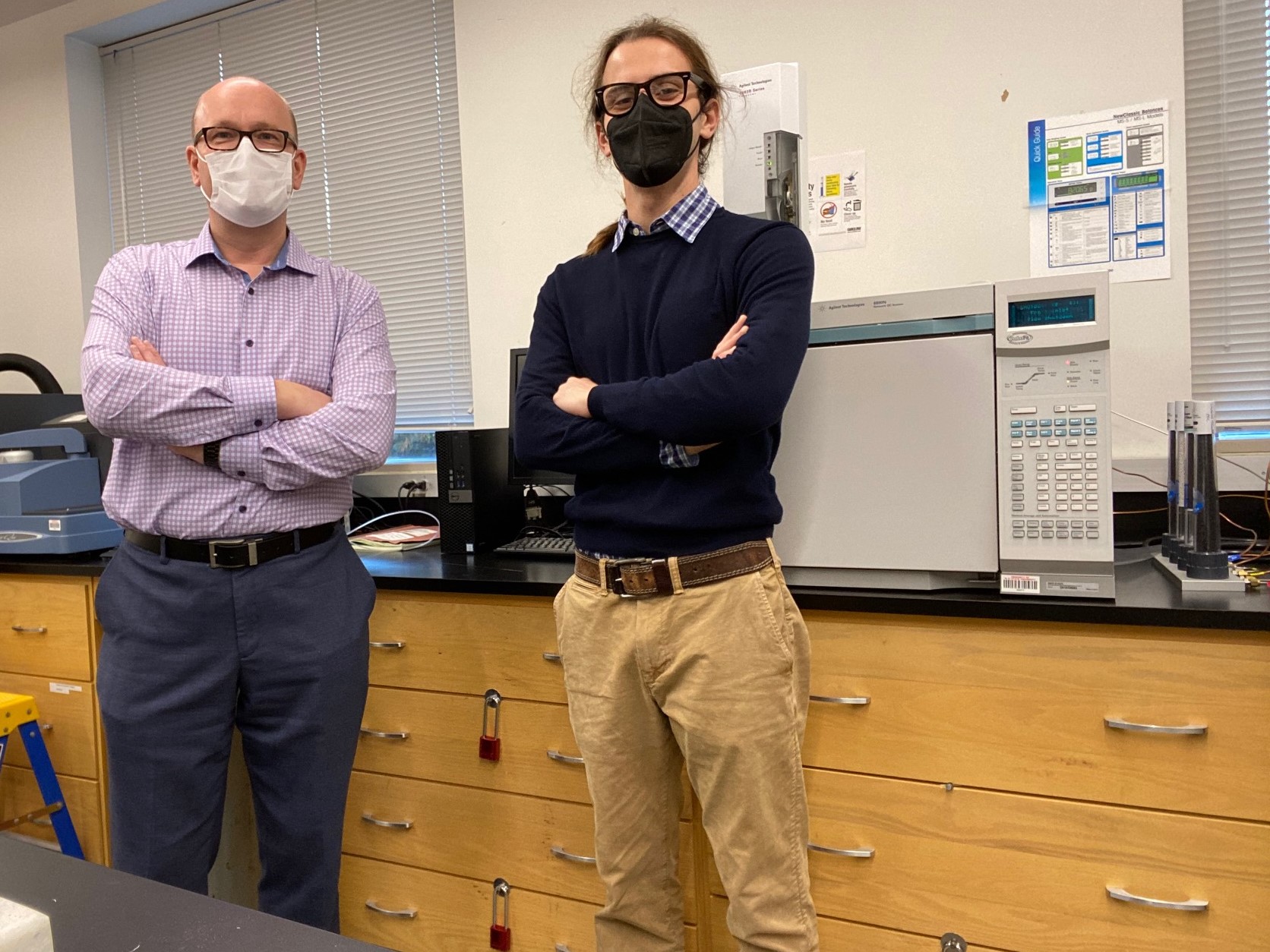
#11 - Catarina Barbosa (ITQB-UNL, PT) secondment at GECCO, NL (1st part: Dec 2020, 2nd part: Nov 2021)
2nd part: Nov 2021
After a year break due to the COVID-19 pandemic, Catarina Barbosa could finally return and finish her secondment at Gecco in Groningen, NL.
Thank you to Nikola Lončar for hosting her at Gecco and to Rosalie Kleissen and Marta Zavattieri for the Teamwork. Cofactor-dependent enzymes require special expertise, so Gecco is the right place for Catarina Barbosa to do her secondment and get a step closer to developing enzyme-based biosensors.
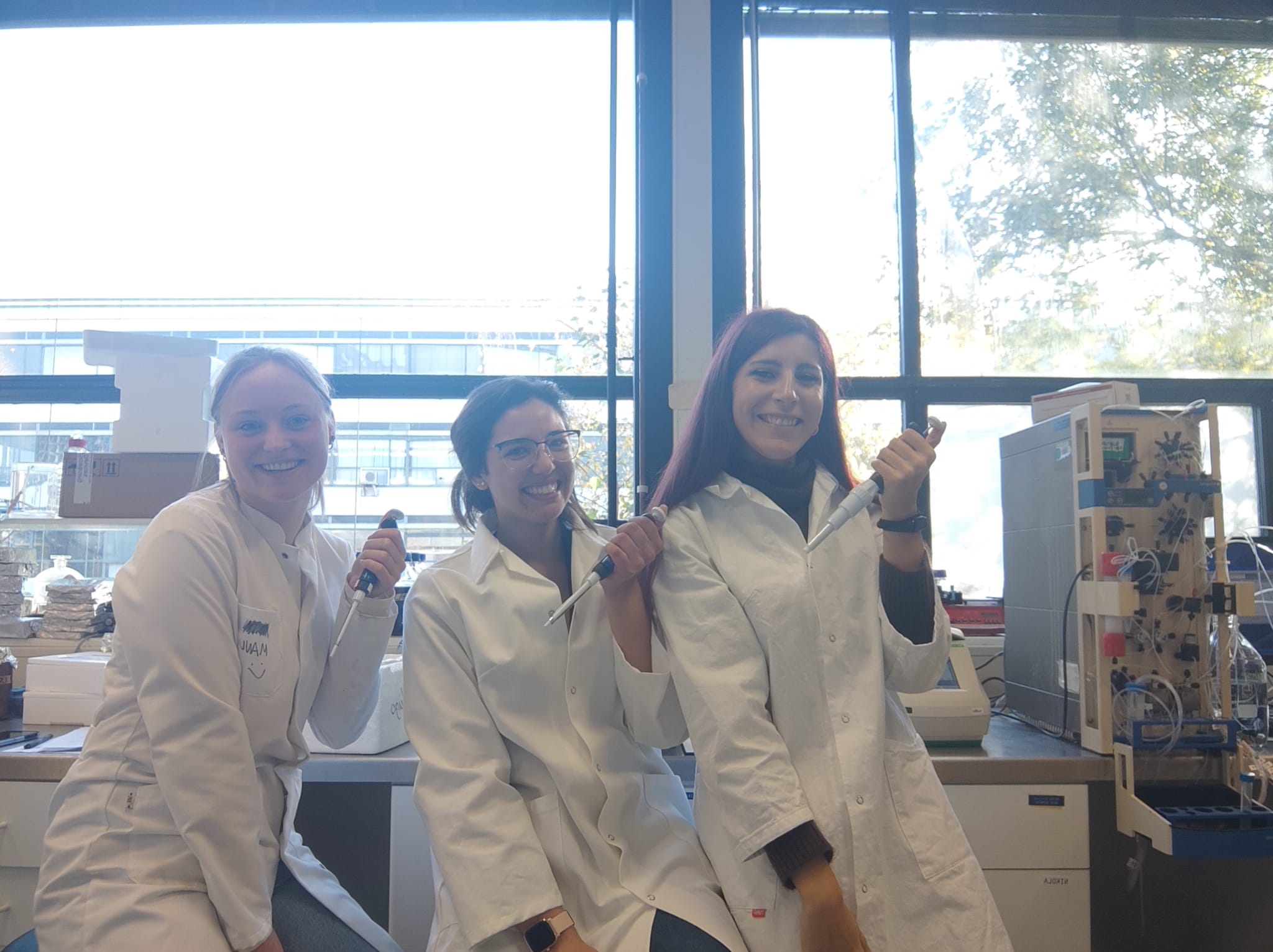
1st part: Dec 2020
Catarina's work was focused on the heterologous production and purification of DyPs for further biophysical characterization (resonance Raman (RR) Spectroscopy, UV-Vis spectrophotometric, cyclic voltammetry, and RR redox titrations). Catarina also produced Cbo DyP mutants that were likely to have modified distal heme pocket polarity (changed to a more hydrophobic environment).
Catarina's testimonial
"I had an opportunity to visit Gecco and work there, which is particularly priceless now when the world is still struggling with the covid pandemic, and we face numerous restrictions and limited working hours. I am thankful for this opportunity! I loved every moment of my stay in Groningen, from the people to the workplace and the University; everything was excellent. The team is great, the laboratory is outstandingly equipped, the people are exceptionally lovely, competent, and helpful, and the city is magical!
In this short period of three weeks, we were able to reach our rather ambitious goals. It has been a unique experience for me as a Ph.D. student, which will help me to grow as a scientist and learn the aspects of protein biochemistry that are not available at my home laboratory."
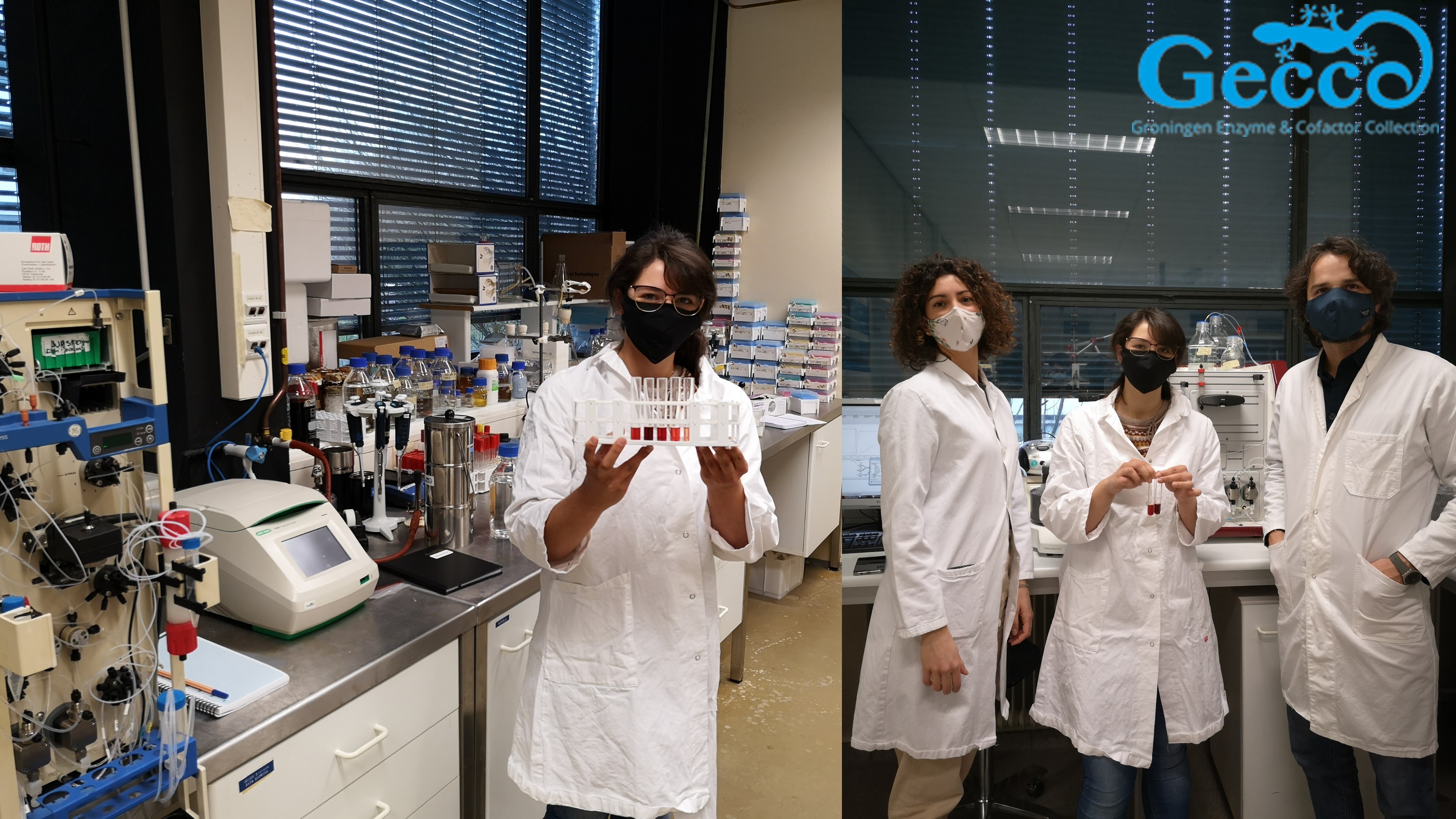
#10 - Jonathan Szuster (INQUIMAE, AR) secondment at ZYMVOL, ES (Jan - Sep 2020)
Jonathan´s work focused on identifying the main structural features that determine the reduction potential of T1 copper sites in both engineered and wild-type ba3 cytochrome c oxidase from Thermus thermophilus. The research involved in silico construction of chimeras when X-ray crystal structures are unavailable, QM and QM/MM energy calculations to dissect contributions from the metal surroundings and test the effect of point mutations in stabilizing oxidized and reduced states and solvent accessibility to the metal site.
Jonathan's testimonial
"Unfortunately, COVID decided to struggle with humankind in the middle of my secondment, the first time I got the chance to cross the ocean…but an experience is an experience, isn´t it?? During the first couple of months of my secondment, I had the pleasure of working (physically) at Zymvol Biomodelling, which was extraordinary! I loved the place and the people! I have to be honest; I was quite nervous, but this feeling disappeared as soon as we had our first beer together (after the office, of course!). Zymvol´s team is great! They are good people with a great sense of humor! I have a really good time with them! I walk to work daily to get to know the city; Barcelona is gorgeous!!! I am quite happy that we accomplished our goals from an academic standpoint. Our problem wasn´t trivial, and much care to detail was needed. The new skills I learned are important for my training and will greatly help my Ph.D. thesis. Before this point, my work was mostly experimental, and here we change methodology 180 degrees! You know, facing the Linux terminal for the first time and learning how to move in there…baby steps at the very beginning…and soon I was doing actual things in that little black screen…yeah definitely, a great activation barrier was crossed within this period, and I am thankful for that."
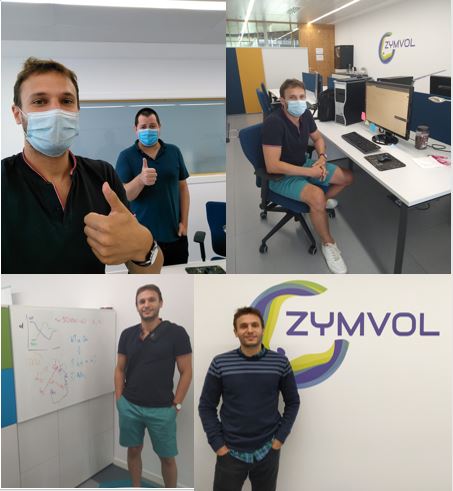
#9 - Lur Alonso (ZYMVOL, ES) secondment at University of Groningen, RUG, NL (Dec 2019-Dec 2020)
Lur used computational tools to predict mutations using FRESCO on various ligninolytic enzymes, oxidases, and monooxygenases to increase the substrate scope, the catalytic efficiency for target reactions, and the enzymes' thermal stability. Work performed also included optimizing the computational algorithms. FRESCO is a methodology to stabilize proteins in silico semi-automated. Currently, it is one of the most reliable tools available.

#8 - Santiago Oviedo Rouco (INQUIMAE, AR) secondment at Technische Universität Braunschweig, TUBS, DE (Nov 2019-March 2020)
Santiago had exploited the binding properties and the electron transfer pathway of a ferredoxin containing a [3Fe-4S]-cluster and Cyt P450 monooxygenase CYP222A1 from Thermobifida fusca. Work included the identification of candidate residues in the CYP222A1 interface, construction of mutants by site-directed mutagenesis, production in E. coli, and enzyme purification.


Santiago's testimonial
"The past two months have been probably the most challenging in my life. For the first time, I moved out from the city where I had lived all my life. I traveled almost 12000 kilometers to a new country and continent. For me, a different culture, a language I can't speak, a different season of the year and time zone, a city far, far away from everyone I know... And I haven't felt any regret any single time. My time here in the Technische Universität Braunschweig biochemistry department has been amazing so far. Dr. Anett Schallmey and everyone in her lab make me feel very welcome. I had the opportunity to meet new and interesting people, and I learned a lot from our cultural similarities and differences. Braunschweig is a small city in the heart of the country, and most people here are Germans, so I can say without a doubt that I'm having "the full German experience." I am lucky to have enjoyed a real Deutsch Weihnachten (German Christmas) and Braunschweig's beautiful Weihnachtsmarkt (Christmas market). Being here at Christmas time and walking into a Christmas market is one of the most beautiful and interesting things to do in Germany, and it is a must if you are visiting Germany! On the other hand, the scientific experience is great as well. It is very good for Ph.D. students like me to learn new subjects, techniques, and different points of view and share ideas with new people. My background is in physical chemistry, but here I'm in a biochemistry laboratory, so I'm editing genes, working with microorganisms, and even expressing proteins for the first time. The secondment at Dr. Schallmey's Lab is improving my Ph.D.; the skills I'm learning here will greatly help me."
#7 - Tiago Cordeiro (ITQB-UNL, PT) secondment at ZYMVOL, ES (Nov 2019)
Tiago Cordeiro applied computational tools for protein loop modeling with SAXS, Rosetta, and MD to explore different conformational dynamics of loops in wild-type and engineered laccases.


Tiago's testimonial
"We believe that sharing knowledge and ideas from research to market and vice-versa generates ethical and sustainable business. The B-LigZymes program fosters collaborations across sectors, disciplines, and countries and a shared culture of research & innovation (R&I) that welcomes and rewards creativity and entrepreneurship. Be thrilled by the enthusiastic Tiago Cordeiro's Testimonial from ITQB-UNL: " Zymvol Biomodeling SL is a rising star! They're driven and among the coolest "partners in crime" to unleash the power of enzymes. Barcelona is a fantastic city. It is always nice to return."
#6 - Ulises Zitare (INQUIMAE, AR) secondment at the University of Groningen, RUG, NL (Oct 2019-May 2020)
Ulises's work objective is to study the electronic and redox properties of Dye-decolourising peroxidase (DyPs), employing various biochemical, spectroscopic, electrochemical, and computational methods. The aim was to find a correlation between electronic/redox descriptors, structure, and enzymatic parameters. A novel type D DyP obtained in silico by ancestral sequence reconstruction has been biochemically characterized. Ulises acquired new skills in molecular biology and enzyme engineering through rational approaches, as well as biochemical and kinetic analysis of enzyme variants.


Ulises's testimonial
"My social experience here in Groningen is as enriching as the academic one. Being a small city with a big university, Groningen has a very youthful vibe. Besides, there are plenty of people from all around the world, so everybody, even Dutch people, speaks perfect English. My current coworkers have been welcoming since the first day and have shown me how people have fun here. Friday and Saturday nights are great, full of restaurants, pubs, and bars of different kinds. People here are very easygoing and making friends and having a good time is easy. But not only nights are interesting in Groningen. The city is beautiful and has many nice details and cultural attractions, like historical places and museums. Moreover, it is surrounded by nice little towns and beautiful landscapes of different types. Cycling for several hours and discovering all those places have been a lovely way to spend some weekends, despite the bad weather. Last but not least, very interesting cities such as Amsterdam or Rotterdam are a few hours by train from here, and I took advantage of that also by visiting them during some weekends."
#5 - Smilja Todorovic (ITQB-UNL, PT) secondment at INQUIMAE, AR (Oct-Dec 2019)
Smilja tested different immobilization strategies of DyPs suggested by theoretical approaches in electrodes, employing surface-enhanced resonance Raman spectroscopy and trained in Raman imaging techniques.
#4 (1st part)- Margarita Stirz (Technische Universität Braunschweig, DE) secondment at ZYMVOL, ES (Sep-Nov 2019)
Margarita's work, part of her Ph.D., was focused on acquiring skills in molecular modeling to gain better insight into the catalytic mechanism of
β-etherizes. Using YASARA (Yet Another Scientific Artificial Reality Application), a computer program for molecular visualization, modeling, and dynamics, homology models of newly characterized β-esterases were constructed. Substrate docking was performed with different model compounds. and these structures have been used for further molecular dynamic (MD) simulations to identify catalytic key residues whose role was experimentally assessed.

#3 - Emanuele Monza (ZYMVOL, SP) secondment at the University of Groningen, RUG, NL (Jul 2019)
Emanuele gave lectures in the Masterclass “Computational Approaches and In Silico Enzyme Library Design for Applied Biocatalysis" (2-5 July), in the Short Training Workshop BLigZymes on “Bacterial Oxidoreductases for Lignin Valorization” (7 July) showing how we use computer simulations to redesign oxidoreductases and presented a poster on on-going work in the BioTrans 2019 Conference (7-11 July). Emanuele organized a Zymvol booth at this conference. The first event represented a unique opportunity to be in contact with experts in the field from all over Europe and also get in touch with students interested in computational enzyme design. The second event was fundamental to showing advances in the project and strengthening ties with the collaborators. The third event was one of the biggest conferences in the world in biocatalysis, hosting more than 700 scientists. The last event allows for meeting key players in the field, both from industry and academia, contacting current collaborators, and establishing new relationships.
https://www.rug.nl/research/gbb/education/masterclasses/computational/

Emanuele's testimonial
"All the objectives have been completed. I disseminated our work at three distinct events, reinforced ties with Fraaje’s group, and networked with academic and industrial representatives. The interaction with outstanding computational enzyme design community members during the masterclass was a unique opportunity for growth for the company and me as a scientist. The lecture propelled a proficuous Q&A session, mainly focused on detecting functional mutations far from the active site (part of our ongoing research). I had the pleasure of meeting outstanding scientists in the field: Jiri Damborsky and David Bednar from Loschmidt laboratories in Brno; Marc van der Kaamp from Bristol University; Dick Janssen and Hein Wijma from Groningen. I had the chance to learn about their current research, and the hands-on sessions were precious for me to become more proficient with computational tools that are very interesting for our company research."
#2 - Dimitris Argyropoulos (NCSA, USA) secondment at Ca' Foscari University of Venice, UNIVE, IT (Jul 2019)
During this period, a gel permeation chromatographic system was installed at Professor Crestini's new laboratory at the University of Venice. The system was initialized and calibrated, and a series of test runs were executed with various lignins. Furthermore, during the secondment professor, Argyropoulos had the opportunity to interact with various host department members and local industry members. Dimitris offered training sessions to interested graduate students and faculty in the area of biorefinery on three topics: (I) the Nature and chemistry of biomass components & biopolymers, (II) Industrial operations of biomass processing, and (III) Challenges and opportunities in valorizing lignin. Dimitris's involvement in the B-Ligzymes project has inspired him to undertake a literature research endeavor that, during the period of the secondment, resulted in the following publication: “Are lignin-derived carbon fibers graphitic enough?” Green Chemistry 10.1039/c9gc01806a, in which the project was acknowledged.

#1- Magali Scocozza (INQUIMAE, AR) secondment at ITQB-UNL, PT (May-Nov 2019)
Magalí's work aimed to identify a putative binding site for manganese in Bacillus subtilis BsDyP. During her secondment, she was trained in microbiology (cultivation of recombinant E. coli strains), biochemistry (protein purification and characterization, including steady-state kinetics), and molecular biology (cloning genes and site-directed mutagenesis). During this period, she participated in the B-LigZymes workshop and presented her work with a poster at the Biotrans2019 Conference. She has supported outreach events such as the European Researcher’s Night 2019 and ITQB Open Day.
.
Magalí's testimonial
"This 6-month experience has been, without a doubt, the most challenging one in my life. I’d just finished my bachelor’s degree, and in just one month, I found myself starting my Ph.D. in Lisbon, Portugal. I was out of my comfort zone: away from my family, my friends, my language, and even my field of knowledge, since I am a chemist and most of the work I started doing in Dr. Lígia Martins’ lab was in the field of microbiology, biochemistry and molecular biology. I was also living alone for the first time! The amazing thing about all these “obstacles” is that when you finish, you can look back and be extremely happy about your results. This secondment improved my scientific knowledge (for sure), but it also taught me a lot about life. None of these things could have been possible without the guidance and help from Lígia: thank you! The people from the lab were always there for me, helping me with the benchwork, answering questions, and even taking me out to discover Lisbon. So, I can say that I learned new techniques, new ways of thinking, I got to live in a beautiful city full of life, and I even made an amazing friend (Francisco) who I think will remain for life."






